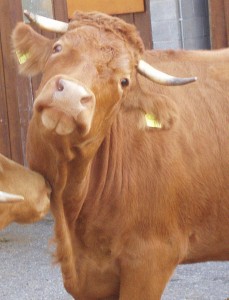 Studies have found pigs to have a similiar intellect to a three year old human, and researchers are finding that we have long underestimated the mental abilities of chickens.
Studies have found pigs to have a similiar intellect to a three year old human, and researchers are finding that we have long underestimated the mental abilities of chickens.
Yet still, a strict vegan or vegetarian diet does not appeal to everyone.
However, if the origin of your meat has ever weighed upon your conscience, but you have found yourself resistant to adopting a fully vegetarian or vegan lifestyle, ethical omnivorism may be the answer.
Ethical omnivores eat meat, but avoid purchasing and consuming animal products that can be traced to the factory farming industry.
In The Ethics of What We Eat, philosopher and animal rights advocate, Peter Singer describes ethical omnivorism as the philosophy that, ‘it is ethical to eat animals that have lived good lives and would not have existed at all, except for the ready market for their meat.’
Ethical omnivorism is the recognition that an omnivore lifestyle does not have to be void of compassion and accountability. Ethical omnivores adopt a sense of responsibility of informing themselves about the food they put into their bodies; where it comes from, how it is processed, and in the case of livestock, how it is treated.
Ethical omnivorism is the recognition that small, everyday choices made at the supermarket or local butcher can mean the difference between an innocent creature suffering unnecessarily, or living a more humane life.
Say no to factory farming:
Factory farms exist to satisfy our massive appetite for meat and animal by-products. Factory farming is a ruthless and cyclical operation, driven by the need to meet society’s demand for animal products. Consequently, the welfare of animals that pass through these operations is often cruelly ignored.
Factory farms imprison pregnant pigs and nursing mothers in tiny metal stalls that are only slightly bigger than their bodies. Unable to move or properly interact with their babies, they and their offspring are reduced to little more than next week’s grocery products, waiting to be stocked at your local supermarket.
You can refuse to provide your business to producers that use factory farming, by seeking out local suppliers of humane meat online, or simply asking your local supermarket, butcher or delicatessen where they source their products.
Moderate your intake of animal products:
Our dependence on the livestock industry is not just bad news for animals; it’s also extremely harmful to the environment, with the Food and Agriculture Organisation of the United Nations finding that livestock production accounts for 18 per cent of all global warming gases.
With a recent study finding that just one portion of processed red meat a day can increase the chance of an early death by 20 per cent, cutting back your meat consumption is good for your health, as well as for our furry and feathered friends.
However, if you find you’re really craving bacon, sausages or a burger, fear not; mock meat has come a long way in the last few years, and many of these substitutes, made from soy and vegetable protein are extremely convincing.
Go free range:
Buying free range eggs is perhaps the simplest step an ethical omnivore can take. Free range eggs are clearly labelled at the supermarket, and the price difference between cage and free range is negligible when weighed against the brutal conditions endured by battery hens. If you’re unsure about whether to choose barn laid or free range, Animals Australia provides all the information you need to decide in a handy chart.
Ethical omnivorism fosters the idea that we have a responsibility to educate ourselves about where our food is sourced and how it is raised and treated. It is the acknowledgement that the mentally ‘ignorance is bliss,’ is a breeding ground for exploitation and cruelty.
Is knowing where your dinner came from, and how it was treated important to you? Do ethical concerns influence your product choices at the supermarket?
Let us know your opinions below:
 Alyce Hogg is studying a Bachelor of Journalism with Honours. You can follow her on Twitter @alycehogg.
Alyce Hogg is studying a Bachelor of Journalism with Honours. You can follow her on Twitter @alycehogg.






